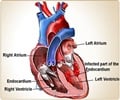According to a new study, women are likely to respond differently to heart failure treatment than men.
The study raises concerns over whether current practices provide the best care to the sufferers.The researchers have found that striking differences in the risk factors for developing heart failure (HF) and patient prognosis between men and women.
"Current practice is to treat heart failure similarly in men and women," said Dr Eileen Hsich, director of the Women's Heart Failure Clinic at the Cleveland Clinic in Ohio.
"Yet, our review of published reports suggests compelling sex differences, not only in terms of how and when heart failure develops, but also possible responses to treatments and how the disease impacts quality of life," Hsich added.
The study showed that HF affects women at an older age and often with a stronger heart compared to men.
While hypertension and valvular disease are more likely the culprits for HF in women, men are more likely to have coronary artery disease (CAD) as the underlying cause.
Advertisement
"The reasons why survival is better for women remain unclear, but it may be due to differences in the underlying disease," said Dr. Hsich.
Advertisement
There is also evidence of sex-specific differences during cardiopulmonary stress test, which is often used to evaluate patients for heart transplantation.
Women with HF tend to have a better prognosis for any given peak oxygen consumption value when compared to men, yet the cut-off values to determine need for heart transplantation are the same for both sexes.
"We found that some of the available medications may not be as effective in women, while other therapies, for example, beta blockers, aldosterone antagonists and pacemakers, may be very beneficial," said Dr. Hsich,
Although she cautions that these finding should in no way prompt women to deviate from what their doctor recommends.
"We need to remember that the therapy women are receiving must be working because they are living longer. Still, we need to gain a better understanding of HF in women so that we know whether we are providing the best possible care," she said.
The study appears in the Journal of the American College of Cardiology.
Source-ANI
TAN














